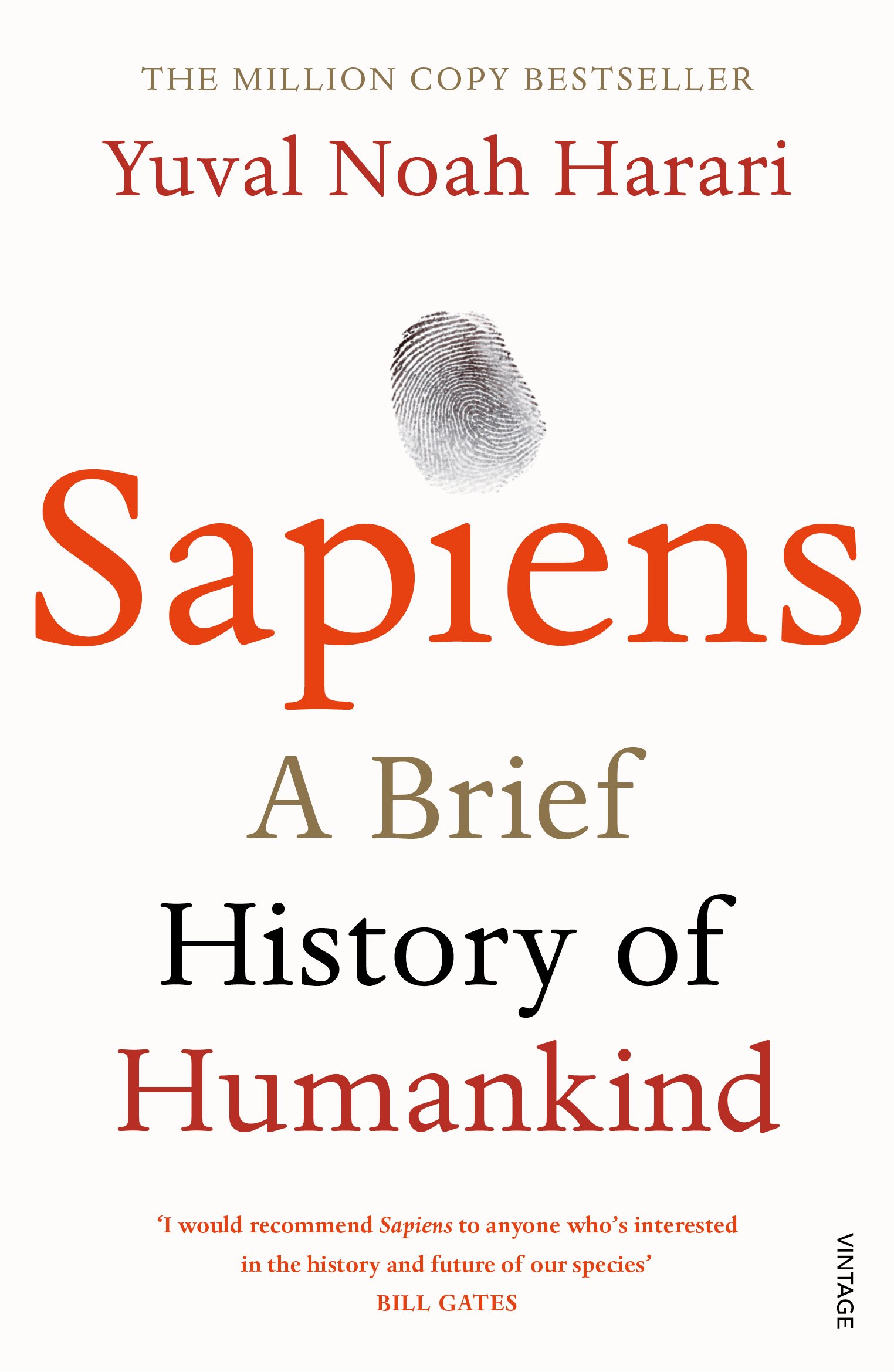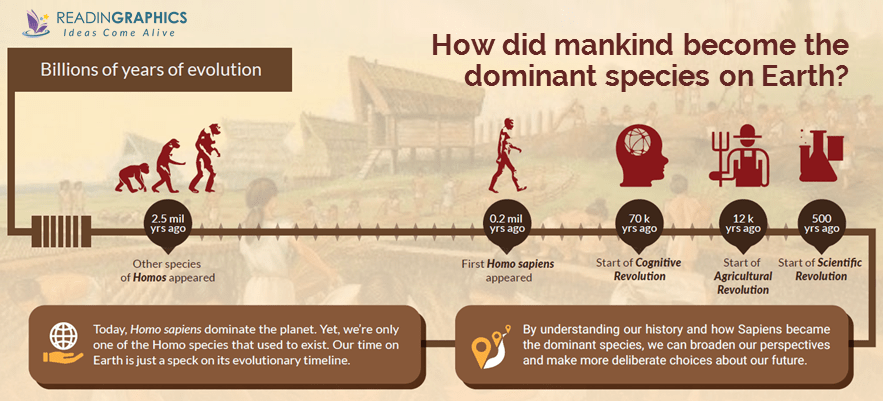When I finished this book, I wished that the textbook had been this interesting so that I wouldn't be so bored with history. I spent all day today summarizing one of the best nonfiction books I've ever read. When I first started writing, however, I realized it was difficult because there were so many things to remember, so I only write down the most important ideas here. It is best to read the entire book to fully appreciate it.
Humans began to evolve from Southern Apes in East Africa about 2.5 million years ago. The human brain evolved without a major evolutionary push over the next 2 million years, and humans did not achieve much. This is man's great fortune.
Humans began to disperse and settle in various areas around 2 million years ago, including North Africa, Asia, and Europe. These groups began to evolve into different human species as a result of habitat differences: Neanderthals in Europe and West Asia, Homo erectus in East Asia, and so on.
Homo sapiens first appeared in East Africa around 150,000 years ago. There are no distinguishing characteristics when compared to other breeds.
A Cognitive Revolution occurred in Homo sapiens 70,000 years ago. The language revolution aided Sapiens in exchanging information and creating a dense network of information. The ability to imagine has enabled a large community of Sapiens to come together and fight for an ideal or in the name of a saint. As a result, Sapiens evolved quickly without the benefit of evolutionary selection. Sapiens spread throughout the world over the next 60,000 years, vying for territory and rapidly driving the rest of the human race to extinction.
Humans first arrived in Australia 45,000 years ago. Humans pushed two-thirds of the animal species to extinction in a few thousand years and drastically altered the ecosystem here, which evolved independently of the Afro-Asian system over hundreds of millions of years.
Humans spread from Siberia to Alaska and then down to the entire Americas 16,000 years ago. Along with the settlement, the ecosystem has undergone significant change.
The Agricultural Revolution occurred 10,000 years ago. Humans began farming after abandoning the hunter-gatherer lifestyle. Food production increased quickly, leading to settlements and population increases. Increasing food and resource reserves are also a source of war, as people seek to conquer those resources rather than continuing to live the hunter-gatherer lifestyle. People also work harder when they rely on a few crop varieties rather than a diverse menu as in the past. Infectious diseases began to emerge as a result of crowded settlements and domesticated animals. Everything happened gradually until people realized they couldn't live without agriculture.
Socioeconomic and political formations that ensured food security and commerce emerged from such large agricultural settlements. There was also social stratification: kings, elites, commoners, and slaves. Social stratification is also caused by the aggressor's desire to rule, limit the growth of the majority, and preserve the minority's privileged interests. Stratification also helps two strangers know how to behave if they recognize each other's class over time.
It all depends on an imaginary order for society to function properly: a constitution and universal laws that everyone agrees are self-evident and indisputable, such as "the right to life, the right to freedom, and the right to the pursuit of happiness." This belief, like national pride or work ethic, helps humanity cooperate in a broad sense and is the most significant differentiator from the rest of the world.
Because these orders are the result of pure imagination, they cannot be passed down to future generations via genes. To keep extensive and detailed date patterns, humans must somehow store this information. Writing was thus born 5000 years ago.
Money appeared alongside writing, first in the form of shells, gold and silver, and then paper money. Paper money is another product of the imagination: people will accept the use of money as long as they trust the state bank.
Money allows people to exchange goods quickly, promoting social specialization. The tailor can now focus on sewing for the villagers because he will be paid and able to buy whatever he wants with money, rather than having to grow and raise livestock himself.
Imperialism emerged and developed around 4000 years ago. Countries attack and rule neighboring countries, gradually expanding their territories, beginning with the desire to invade other countries resources and consolidate power. Despite its brutality, the empire created much of our culture today: great structures, thinkers, and artisans all created while enjoying the empire's affluent conditions.
Religion, money, and empire are the three characteristics that unite humanity, as well as the three most common causes of war. Polytheism emerged from local animisms, such as the curse of a banyan tree god in a certain village, with each deity representing a different power. When monotheism first appeared, it was carried around the world by fanaticism and a missionary spirit. As a result, the world today has only a few major monotheistic religions, such as Christianity, Islam, and Buddhism. Religion has lost influence over the last 300 years, as science has helped to explain supernatural phenomena, and has been replaced by new ideologies such as liberalism, capitalism, nationalism, and fascism.
The Scientific Revolution began around 500 years ago. The human population increased 14 times in 500 years, production increased 240 times, and energy consumption increased 115 times. The Scientific Revolution evolved in tandem with the expansion of the Empire. Modern science is willing to admit its ignorance and embrace new knowledge with boundless curiosity. It is also because of this feature that when European imperialist countries expand their colonies, they always bring scientists to create knowledge maps for new territories. These accumulations over the centuries laid the groundwork for the Scientific Revolution, which began in Europe and gave it a distinct position for centuries.
The manuscript was created. Adam Smith argued in The Wealth of Nations in 1776 that when there is an excess profit (surplus), if people reinvest in production, it will create more profits, more jobs, and thus the foundation for the wealth of the entire society. This is a truly revolutionary idea because, for thousands of years, people have assumed that the total wealth in a society cannot increase, so enriching yourself means making someone else poorer, which is a shameful thing to do. When capital is reinvested in production, the real pie grows for everyone. Credit enters the picture as the economy grows, unlocking everyone's potential. 90% of people's money is invested in the expectation of a better future. This economy is in equilibrium due to competition for all resources, and it may collapse if the expectation bubble bursts. So far, however, every other test has produced negative results.
In the 18th century, the Industrial Revolution erupted. It was essentially a revolution in energy. Man discovers a new source of energy every few decades and converts it into whatever motion he desires. The Industrial Revolution also greatly increased production capacity. As more products are developed and consumed, consumerism emerges, encouraging people to consume and enjoy life.
People first realized they could destroy themselves after the two atomic bombs were dropped on Hiroshima and Nagasaki in 1945. The United Nations was established to prevent a Third World War from occurring. Today, all-out war is unlikely because the costs of war are rising, the economy is becoming more dependent on knowledge rather than natural resources, and true peace benefits all economies.
People are increasingly upgrading themselves through genetic engineering, cyborg engineering, and the creation of inorganic life as modern medicine advances and in the name of healing. "Taking with genes won't necessarily kill us. But we can tinker with our genome to the point where we are no longer Homo sapiens."
"One of history's iron laws is that luxuries tend to become necessities, creating new obligations." This is why the belief that economic growth will increase human happiness is an illusion. The economy's stimulus is only temporary, and it is dependent on each individual's relative circumstances. There are numerous approaches to happiness. Buddhism believes that people should let go of their expectations, live in the present moment, and accept things as they are. Psychologists believe that when people find a reason to live, they will be happy even when they are suffering. Happiness, according to biologists, is controlled by genes that regulate serotonin, dopamine, and oxytocin levels. This concentration is influenced by psychological and social factors, but it has a general limit. There is no final or all-encompassing answer.
This is a book full of interesting information on many different aspects of history, all wrapped up in a rather engaging writing style. It also presents the author's ideas, some of which I find particularly intriguing. The two ideas that most impressed me, though they are still subject to further debate, were: human narratives/imaginations play a very important role in shaping and maintaining socio-economic structures; and the idea that the agricultural revolution was a step backward for human happiness rather than a step forward, as many people believed.
It is not only history, but it also gradually reveals our dark sides. Is superiority beneficial when we gradually regard ourselves as saints and other creatures as insignificant? Evolution does not produce happiness, but rather unhappiness and sadness. The more people who pursue outlandish ideas, the closer we come to extinction. The author writes quickly and is not at all dry. This book is well worth reading if you want to understand what it means to be human and where human ambition ultimately leads.
The book connects the content very well, coherently, and logically. The book is dense with information, but reading it is not like listening to someone tell a story, but rather like being appealingly taught by a passionate teacher. In terms of logic, while reading, I came across a lot of questions and questions, and these questions were mostly answered one after the other. This demonstrates the author's ability to lead the argument as well as the book's comprehensiveness and completeness.
What I like best about this book is how Harari provided me with different perspectives on historical events, from whether the agricultural revolution truly liberated people to how humans evolved. Humans differ from other species in their ability to collectively believe in an imaginary world/order, shaping the social structure of each moment. The world and human society are like kaleidoscopes, and Harari has twisted an angle to give his unique, highly systematic perspective, which is very interesting, if somewhat controversial. After reading it, I am very curious to learn and explore the angles and other details of that kaleidoscope to form my own perspective.
Takes you through a world of hundreds of thousands of years, from the beginning of time to modern science today, with a massive amount of knowledge encapsulated in just 500 more pages and extremely easy to understand! This is not an easy task, especially with work on such a broad topic as anthropology, but Yuval Harari made it look as easy as the back of his hand; I adore you!
Close the book and ask yourself, "Are you truly happy?"



